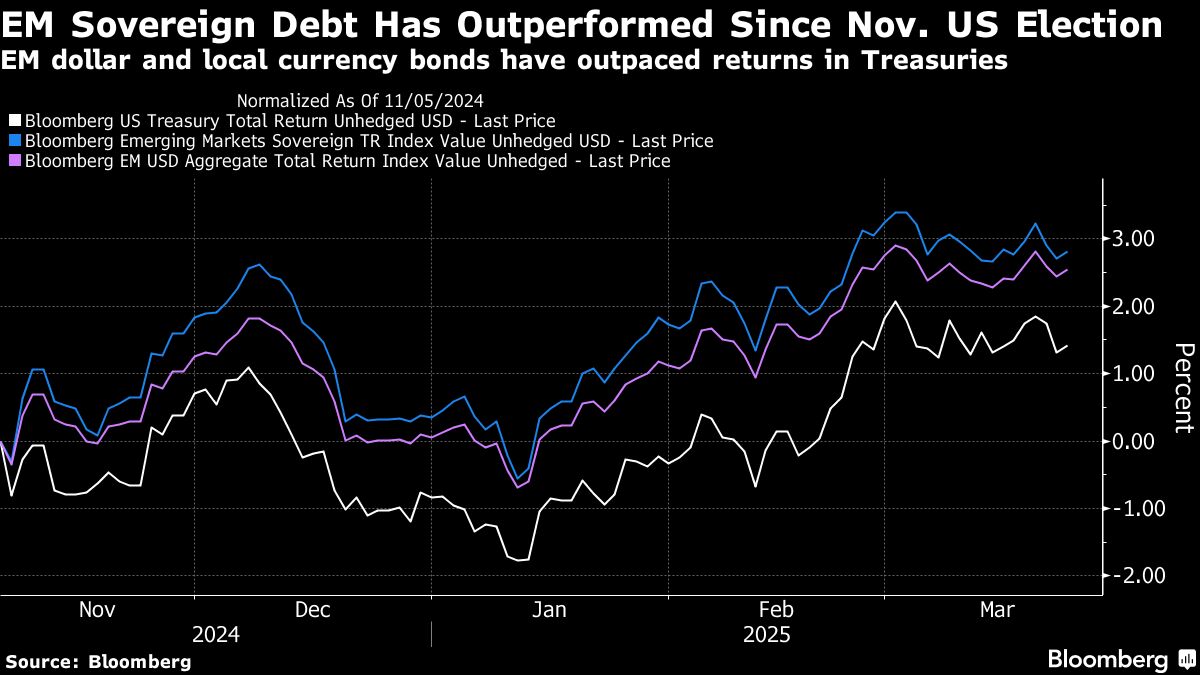Emerging Markets Surge as Investors Bet on US Economic Weakness

Caption: Emerging market stocks and currencies are rallying as investors shift focus away from US economic concerns. (Source: Yahoo Finance) In a surprising turn of events, emerging markets (EM) are experiencing a significant rally as investors increasingly bet on a slowdown in the US economy. With concerns over inflation, interest rate hikes, and potential recessions in developed markets, capital is flowing into higher-growth regions, fueling optimism in countries from Brazil to India. This shift marks a stark contrast from previous years when the US dollar’s strength and Federal Reserve policies dominated global investment strategies. Now, emerging markets are seizing the spotlight—but will this trend hold?
Why Investors Are Turning to Emerging Markets
Several key factors are driving the newfound enthusiasm for emerging markets: 1. US Economic Uncertainty – Rising inflation, slowing GDP growth, and fears of a prolonged high-interest-rate environment have made US assets less attractive. Investors are seeking alternatives with higher potential returns. 2. Weaker US Dollar – A softening dollar reduces pressure on emerging market debt and makes exports more competitive, boosting local economies. 3. Attractive Valuations – After years of underperformance, many EM stocks and bonds appear undervalued compared to their developed-market counterparts. 4. Commodity Boom – Countries like Brazil and Indonesia benefit from strong demand for oil, metals, and agricultural products, supporting their currencies and stock markets.
Key Markets Leading the Rally
Not all emerging markets are created equal—some are outperforming others due to favorable policies, strong fundamentals, or geopolitical advantages.
Brazil: A Commodity Powerhouse
Brazil’s stock market has surged as rising commodity prices bolster its export-driven economy. The Brazilian real has also strengthened, attracting foreign investors looking for high-yield opportunities.
India: Tech and Manufacturing Growth
India’s rapidly expanding tech sector and government-led manufacturing incentives (such as the "Make in India" initiative) have drawn significant foreign direct investment (FDI). The Indian rupee has remained resilient despite global volatility.
Southeast Asia: A Rising Star
Countries like Vietnam and Indonesia are benefiting from supply chain diversification away from China. Vietnam, in particular, has seen a surge in manufacturing investments, boosting its stock market and currency.
Risks and Challenges Ahead
While the rally is encouraging, emerging markets still face hurdles: - Fed Policy Shifts – If the US Federal Reserve resumes aggressive rate hikes, capital could quickly flow back to dollar-denominated assets. - Political Instability – Elections, policy changes, and social unrest in countries like South Africa and Turkey could deter investors. - Debt Concerns – Some EM nations, including Argentina and Pakistan, remain vulnerable to debt crises if global liquidity tightens.
What This Means for Global Investors
For those considering exposure to emerging markets, diversification is key. Exchange-traded funds (ETFs) focused on broad EM indices or specific regions can mitigate risks while capturing growth. Additionally, investors should monitor: - Central Bank Policies – EM central banks may cut rates if inflation cools, further boosting local markets. - Commodity Trends – A sustained rally in oil and metals could extend the outperformance of resource-rich economies. - Geopolitical Developments – US-China tensions and regional conflicts could disrupt trade flows.
Conclusion: A Cautious Optimism
The current rally in emerging markets reflects a broader shift in investor sentiment—one that favors diversification amid US economic uncertainty. While risks remain, countries with strong fundamentals, stable policies, and commodity advantages are well-positioned to benefit. For now, the tide seems to be turning in favor of emerging markets, but prudent investors will keep a close eye on macroeconomic signals to navigate potential volatility ahead. [IMAGE_2] Caption: A trader monitors emerging market indices as capital flows shift toward high-growth economies. (Source: Bloomberg) Would you consider increasing your exposure to emerging markets in this climate? The answer may depend on your risk appetite—but one thing is clear: the global investment landscape is evolving rapidly.